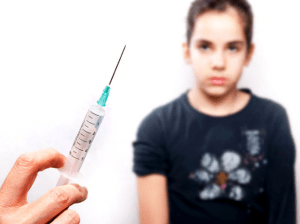Should Parents Be Taxed or Fined for Not Vaccinating Their Children?
Vaccinations became a popular talking point after the Disneyland measles outbreak occurred earlier this year. The topic became very divisive and individuals were either pro or anti-vaccinations. Regardless of which side you are on, it is undeniable that there is a rise in unvaccinated children in the United States. According to the Center for Disease Control and Prevention (CDC):
- The national average of school children vaccinated for measles, mumps, and rubella (MMR) is 95%, but this number is not consistent throughout all 50 states.
- 26 states have not reached the national goal of 95% and fall far below.
 The average number of vaccinated children varies from state to state due to various state exemptions and vaccination requirements.
The average number of vaccinated children varies from state to state due to various state exemptions and vaccination requirements.
- 48 states allow parents to opt out of vaccinations through religious exemptions.
- 20 states allow parents to opt out based on philosophical exemptions.
- States also provide for medical exemptions for children going through chemotherapy or other health treatments that would not allow for vaccinations.
Due to the rising number of children not partaking in vaccinations and the spread of deadly diseases like the measles, many want to know if parents can be held legally accountable for not vaccinating their children.
The cost of outbreaks can be high for both families affected by the disease and the general public. For example, a single case of measles can cost state agencies more than $10,000 to track and stop the spread of the disease.
Due to the economic and physical harms that anti-vaccination can cause, some are calling for vaccine taxation or even more severe penalties, such as legal liability. Proponents of a vaccine tax want non-vaccinating parents to front the bill for these costs. The proposed procedure is to impose fees or have parents pay a charge up-front for not vaccinating.
Many supporters of the tax believe that it’s justified because it would be a deterrent for parents who do not vaccinate their children. Also, supporters believe it would be fair to parents that do vaccinate their children because they wouldn’t be force to pay for the risks taken by non-vaccinating parents.
On the other hand, many people are skeptical that this solution would work because tracking down the unvaccinated individual responsible for the outbreak would be difficult. Still, many are in support of taxes because they believe money is a great motivator that can change an individual’s behavior and choices with regards to vaccines.
States have yet to adopt these taxing laws, so there really isn’t a definitive answer to whether these penalties will be effective or not. Only time will tell if vaccination trends will naturally change or are influenced by government intervention.

Comments